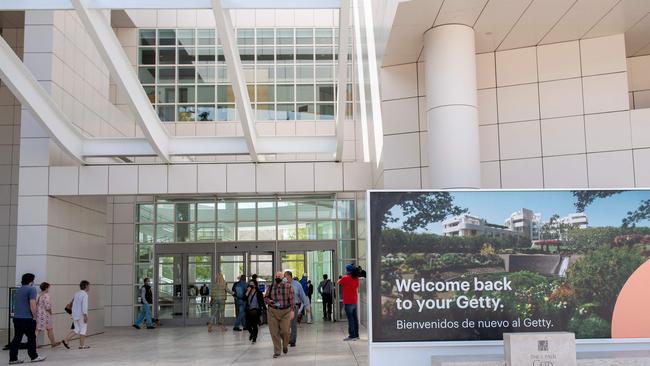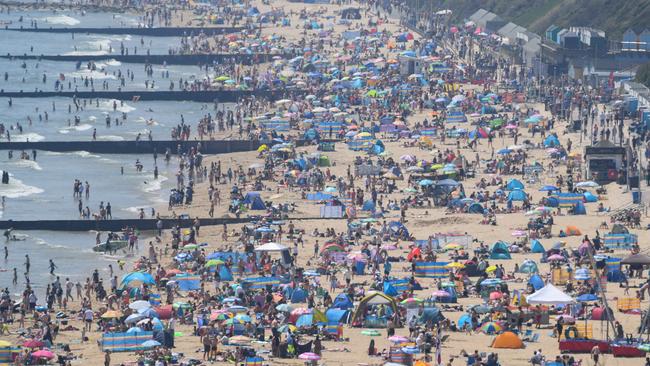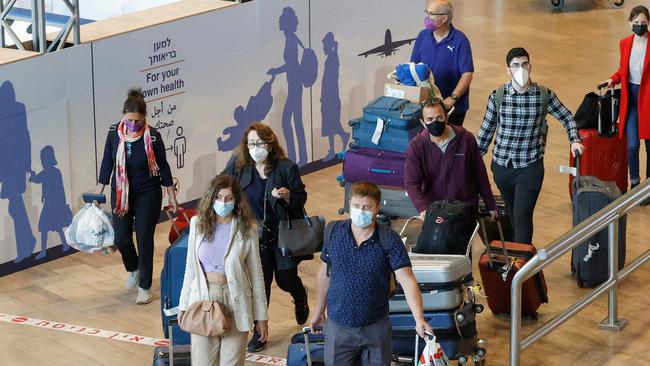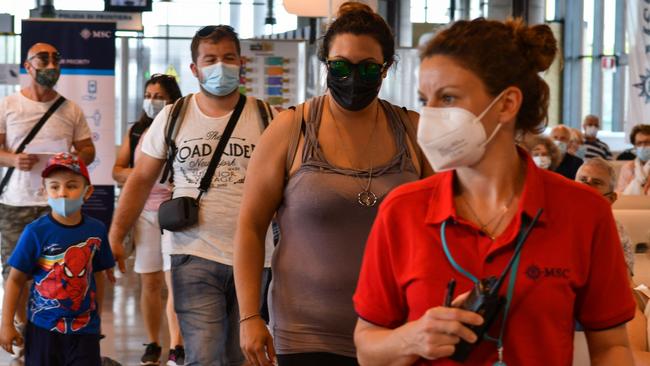How Australia is watching the world trace a path out of the Covid-19 pandemic
More than a year from the start of the pandemic, the rest of the world is slowly getting back to some kind of normal. So where does that leave us?
NSW
Don't miss out on the headlines from NSW. Followed categories will be added to My News.
Nothing’s forever – not even pandemics. And the coronavirus is no exception.
Eighteen months since the start of the Covid-19 pandemic, death rates are down in some of the hardest hit countries, borders are falling, global air travel is increasing, and life is slowly but surely getting back to something that looks somewhat like normal in some of the places that were hardest hit.
How these countries perform over the coming months will begin to point the way out of the pandemic – and give Fortress Australia a road map that we will have to urgently take lest we get left behind.

In the United States, where at its peak earlier this year around 3400 Americans were dying every day from Covid, that rate has plunged to less than 500 – or less than two people per million.
As Victoria suffers through yet another lockdown, across the Pacific hard-hit, lockdown-weary American states like California are making moves to open up, and social life is returning to normal.
There, a combination of a successful vaccination program, immunity likely acquired by those who have recovered from Covid, and new treatments including monoclonal antibody therapies which enhance or mimic the body’s immune responses, are credited with keeping the disease at bay.
As one sufferer, 55-year-old Guadalupe Ramirez told USA Today about her bout with Covid and subsequent recovery using the therapy, three days after the treatment, “I wanted to go jogging — I woke up like somebody gave me a happy pill.”

In the UK, where a lightning-fast vaccination program has seen around two-thirds of its population get at least one dose of the jab, the average daily death rate is now around 7 per day, and the country is reopening to the world with a green/amber/red lane system — though concerns about the spreading “Indian” strain may push back their planned June 21 reopening.
Britain has also launched an antivirals task force to identify and create treatments that can be used by people at home who have tested positive to stop the spread and speed recovery, as well as to protect those who for whatever reason cannot take vaccines.
Israel, too, rolled out the jab with military efficiency, and has gone from seeing more than 8500 cases per day to just a handful every day.
There, the effort has been so successful that one bus company that had placed hand sanitiser dispensers on board its vehicles has repurposed them to dispense sun screen.

While they kept borders largely shut during the pandemic, Israeli officials are planning to open the borders from July to anyone who can show they’ve been vaccinated and tested negative before their flight – no quarantine required.
Across Europe, countries like Italy and Spain are going into the northern hemisphere summer with similar entry requirements, looking to safely kickstart their tourist economies with similar entry requirements.
John Voigtmann, an American-born hotelier who owns the La Bandita Townhouse and Countryhouse hotels in the Tuscan town of Pienza, says, “Thanks to the sacrifices of everyone the virus is under control and we are just happy to be back to work, welcoming people from all over the world.”
Experts point out that all pandemics peter out eventually, and that even Spanish flu and the plague have not been eradicated from the planet.
But what makes this pandemic different is that, unlike previous ones, this will be the first to be ended largely by vaccines.
“In many ways the pandemic is reaching its end phase, at least in the United States,” says Stanford University medical professor Dr Jay Bhattacharya.
“That means that the disease is becoming endemic, but the vulnerable are protected.”
In the US, where 86 per cent of the elderly population – those who are most vulnerable to Covid – have had at least one dose of the vaccine, Dr Bhattacharya says “cases and deaths are decoupled.”
That’s important, he says, because “even if cases go up you won’t see deaths go up – it makes the panic go away.”
Dr Bhattacharya points to the example of the Spanish flu, which was never eradicated, but which no longer poses the grave threat it did 100 years ago.
“Everyone on the face of the earth will get some form of immunity to Covid either through vaccines or natural immunity, “ he says.

While in Canberra there is muted talk of schemes to allow vaccinated travellers to quarantine at home, the fact is that at the moment international borders are not likely to open to most people for at least another year, or at least until after the election.
Pleas by the likes of the Business Council of Australia for premiers to stop “kneejerk” reactions to future outbreaks and slowly open borders have largely fallen on deaf ears, as have calls to stop focusing on cases.
Flinders University vaccine researcher and director of endocrinology Prof Nikolai Petrovsky says that while the developing world is still suffering greatly from the pandemic, a point routinely made by Scott Morrison in response to pleas to open international borders sooner, vaccination will make travel much easier for Australia to manage.
“Even with vaccination, deaths from Covid are not going to totally stop, but they should become much more manageable within existing healthcare system availability,” says Prof Petrovsky.
“What will happen is what we have seen with other pandemics including HIV where increasingly the developed world will solve the local problem while the disease continues to rage in parts of the developing world for several years to come.
“At some point it is likely that travel restrictions will come into play targeting particular travellers, just as already applies for example to those coming from Yellow Fever endemic areas who have to prove vaccination status.”
For people like Mr Voigtmann, whose business regularly welcomed Aussies before the pandemic, it can’t come a moment too soon.
“Australians are an important segment for us and we are very hopeful that we will be able to see them back here soon,” he says.
While the politics are difficult, made worse by premiers who have hit the panic button at the least outbreak, the danger is that Australia ignores the experience of similar countries, continues to focus on cases rather than hospitalisations or deaths, and “loses another year,” says Dr Bhattacharya.
But to do that, he says, “you have to change the political calculus as well.”
That, ultimately, may be even harder than seeing out the pandemic.




